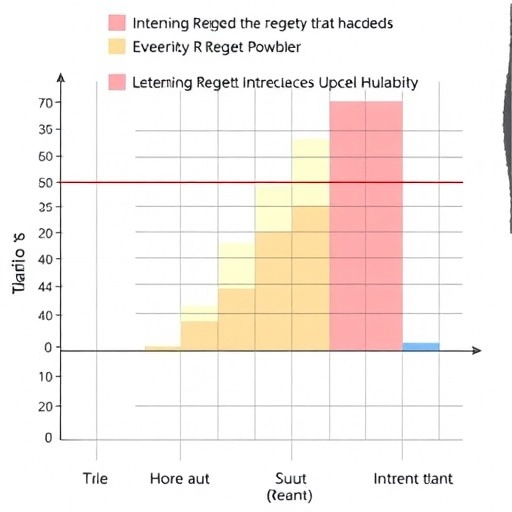In a groundbreaking study poised to advance our understanding of emotional responses, researchers have examined the Turkish version of the Regret Intensity Scale (RIS). This scale has served as a critical tool in measuring the nuances of regret as an emotional experience. The study, conducted by an interdisciplinary team of academics, aims to validate and establish the reliability of this culturally adapted instrument, enriching the psychological and nursing literature surrounding regret, a complex and often misunderstood emotion.
The Regret Intensity Scale has been a significant focus in psychological research, offering insights into how individuals process and experience regret across various contexts. Regret is not merely an emotional response; it is a complex psychological state that can influence decision-making, behavior, and mental health. The validation of the Turkish version of this scale represents a vital step in ensuring that the tool is applicable in different cultural settings, acknowledging the importance of cultural contexts in emotional health assessment.
Previous studies have highlighted how regret can shape individuals’ lives, leading to profound insights about personal responsibility and the outcomes of choices made. The Turkish adaptation of the RIS aims to capture these sentiments accurately within Turkish-speaking populations, a group that has been largely overlooked in prior research. This endeavor is particularly significant given that many existing psychological assessments were created in Western contexts, which may not fully resonate with Turkish cultural experiences of regret.
To establish the validity of the Turkish version of the RIS, researchers embarked on a rigorous process that included both qualitative and quantitative methods. This dual approach ensured that nuances in the expression of regret specific to Turkish culture were captured effectively. Additionally, the research team employed statistical analyses to assess the reliability of the scale, analyzing factors such as internal consistency and test-retest reliability to ensure that the tool would yield consistent results over time.
The significance of this research transcends mere academic interest. Regret has profound implications for mental health, impacting individuals’ well-being and influencing behaviors such as risk-taking and decision-making. By validating a tool that measures regret specifically within Turkish contexts, the researchers hope to provide healthcare professionals with a refined instrument that can enhance psychological assessments and interventions in this region. This step could lead to better mental health outcomes by addressing the specific emotional needs of individuals grappling with regret.
Moreover, the methodology employed in this study is reflective of contemporary trends in psychological research that emphasize cultural sensitivity. Mental health practitioners are increasingly recognizing that tools and interventions must be adapted to fit the unique cultural, social, and emotional landscapes of the populations they serve. This study underscores the importance of developing culturally relevant psychological instruments, which can yield more accurate assessments and interventions tailored to specific communities.
The implications of the research are far-reaching, particularly in healthcare and counseling settings. With the validated Turkish version of the Regret Intensity Scale, practitioners can gain more nuanced insights into their patients’ emotional states, facilitating a more informed approach to therapy and patient care. This could potentially enhance therapeutic outcomes, as understanding the intensity of regret can influence treatment plans and interventions aimed at mitigating its effects on mental health.
As healthcare practitioners begin to integrate the Turkish RIS into their practices, the need for training and education on how to interpret and utilize this tool effectively will also become paramount. It is essential that mental health professionals understand the cultural significance of regret within the Turkish context and how it can affect individuals differently compared to other cultural groups. This understanding will be crucial in ensuring that the tool is applied appropriately and effectively.
Furthermore, the researchers envision that their work will inspire additional studies focusing on the role of regret in various demographic groups. By broadening the scope of research to include different populations and their unique experiences of regret, the field of psychology can develop into a more inclusive and comprehensive discipline. There is much to learn about how culture, upbringing, and societal values shape the way individuals experience and cope with regret.
Ultimately, this research not only contributes to the academic community but also holds promise for enhancing everyday life for individuals dealing with the weight of regret. By acknowledging and validating the complex nature of this emotion through a culturally adapted instrument, the researchers aim to foster a greater understanding of regret and its implications. The potential applications of the validated RIS could extend beyond clinical settings, reaching areas such as education, organizational behavior, and personal development.
As we await the future impact of this validated scale, one thing remains evident: the profound role that cultural considerations play in the psychology of emotions. The validation of the Turkish version of the Regret Intensity Scale could pave the way for similar endeavors in other languages and cultures, ensuring that understanding of human emotions continues to evolve and adapt within our increasingly diverse global society.
In conclusion, the validation of the Turkish version of the Regret Intensity Scale not only signifies a milestone in psychological research but also reflects a growing recognition of the need for culturally sensitive mental health tools. As researchers and practitioners alike embrace this evolution, the hope is that the insights gained will lead to deeper understanding, better care, and ultimately, improved emotional well-being for individuals navigating the often turbulent waters of regret.
Subject of Research: Validity and reliability of the Turkish version of the Regret Intensity Scale
Article Title: Validity and reliability of the Turkish version of the Regret Intensity Scale
Article References:
Coşkun, E.Y., Cura, Ş.Ü. & Özsaban, A. Validity and reliability of the Turkish version of the Regret Intensity Scale.
BMC Nurs 24, 1339 (2025). https://doi.org/10.1186/s12912-025-03992-z
Image Credits: AI Generated
DOI:
Keywords: Regret Intensity Scale, Cultural Psychology, Turkish Version, Validity, Reliability, Mental Health.




